2017 UEFA European Under-21 Championship
| Mistrzostwa Europy U-21 w Piłce Nożnej 2017 | |
|---|---|
 | |
| Tournament details | |
| Host country |
|
| Dates | 16–30 June 2017 |
| Teams | 12 (from 1 confederation) |
| Venue(s) | 6 (in 6 host cities) |
| Final positions | |
| Champions |
|
| Runners-up |
|
| Tournament statistics | |
| Matches played | 21 |
| Goals scored | 65 (3.1 per match) |
| Attendance | 244,085 (11,623 per match) |
| Top scorer(s) |
|
| Best player |
|
The 2017 UEFA European Under-21 Championship (also known as UEFA Under-21 Euro 2017) was the 21st edition of the UEFA European Under-21 Championship, a biennial international youth football championship organised by UEFA for the men's under-21 national teams of Europe. The final tournament was hosted in Poland for the first time, after their bid was selected by the UEFA Executive Committee on 26 January 2015 in Nyon, Switzerland.[1] The tournament took place from 16–30 June 2017.[2] Players born on or after 1 January 1994 were eligible for the tournament.
In March 2012, UEFA announced that the competition would take place in even numbered years from 2016 onwards.[3] In September 2013, UEFA announced its intention to continue holding the final tournament in odd numbered years following a request from its member national football associations.[4] On 24 January 2014, UEFA confirmed that the final tournament would be held in 2017 and that it would be expanded from 8 teams to 12.[5]
Hosts
The hosts were announced at a meeting of the UEFA Executive Committee in Nyon on 26 January 2015. In late April 2014 the Polish football association PZPN very strongly indicated the country has high chances to host the tournament. Bidding to welcome Europe's best youth teams was one of the reasons for Poland's withdrawal from the UEFA Euro 2020 race.[6]
Qualification
A total of 53 UEFA nations entered the competition (Gibraltar did not enter), and with the hosts Poland qualifying automatically, the other 52 teams competed in the qualifying competition to determine the remaining 11 spots in the final tournament.[7] The qualifying competition, which took place from March 2015 to November 2016, consisted of two rounds:[8]
- Qualifying group stage: The 52 teams are drawn into nine groups – seven groups of six teams and two groups of five teams. Each group is played in home-and-away round-robin format. The nine group winners qualify directly for the final tournament, while the four best runners-up (not counting results against the sixth-placed team) advance to the play-offs.
- Play-offs: The four teams are drawn into two ties to play home-and-away two-legged matches to determine the last two qualified teams.
Qualified teams
The following 12 teams qualified for the final tournament.[9]
Note: All appearance statistics include only U-21 era (since 1978).
| Team | Method of qualification | Date of qualification | Finals appearance | Last appearance | Previous best performance |
|---|---|---|---|---|---|
| Hosts | 26 January 2015 | 6th | 1994 | Quarter-finals (1982, 1984, 1986, 1992, 1994) | |
| Group 4 winners | 6 September 2016 | 8th | 2015 | Runners-up (1994, 2015) | |
| Group 5 winners | 6 September 2016 | 7th | 2015 | Semi-finals (1992, 2015) | |
| Group 9 winners | 6 October 2016 | 14th | 2015 | Winners (1982, 1984) | |
| Group 8 winners | 6 October 2016 | 2nd (8th incl. Czechoslovakia) | 2000 | Fourth place (2000) | |
| Group 7 winners | 7 October 2016 | 11th | 2015 | Winners (2009) | |
| Group 1 winners | 7 October 2016 | 7th (13th incl. Czechoslovakia) | 2015 | Winners (2002) | |
| Group 6 winners | 10 October 2016 | 8th | 2015 | Winners (2015) | |
| Group 2 winners | 11 October 2016 | 19th | 2015 | Winners (1992, 1994, 1996, 2000, 2004) | |
| Group 3 winners | 11 October 2016 | 1st | — | Debut | |
| Play-off winners | 15 November 2016 | 13th | 2013 | Winners (1986, 1998, 2011, 2013) | |
| Play-off winners | 15 November 2016 | 6th (10th incl. Yugoslavia) | 2015 | Runners-up (2004, 2007) Winners (1978 as Yugoslavia) |
Final draw
The final draw was held on 1 December 2016, 18:00 CET (UTC+1), at the ICE Congress Centre in Kraków.[10][11] The 12 teams were drawn into three groups of four teams. The teams were seeded according to their coefficient ranking following the end of the qualifying play-offs, with the hosts Poland assigned to position A1 in the draw. Each group contained either the hosts or one team from Pot 1, one team from Pot 2, and two teams from Pot 3.[12][13]
|
|
|
|
Venues
On 7 June 2016, Polish Football Association selected six venues:[14]
| Opening match and Group A | Group A | Group B |
|---|---|---|
| Lublin | Kielce | Gdynia |
| Arena Lublin | Kolporter Arena | Stadion GOSiR |
| Capacity: 15,500 | Capacity: 15,500 | Capacity: 15,139 |
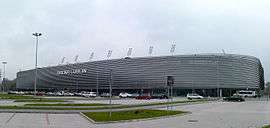 |
 |
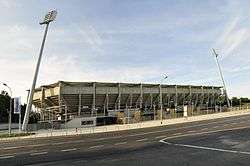 |
| Group B | Group C, semifinal, and Final | Group C and semifinal | |
|---|---|---|---|
| Bydgoszcz | Kraków | Tychy | |
| Kompleks Sportowy Zawisza | Stadion Cracovia | Stadion Miejski | |
| Capacity: 20,247 | Capacity: 15,016 | Capacity: 15,300 | |
 |
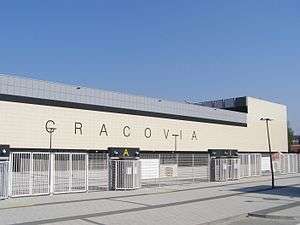 |
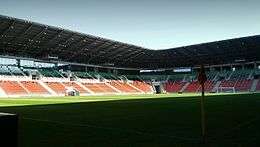 |
Match officials
In February 2017, UEFA selected nine referees and their teams for this tournament.
| Country | Referee | 1st assistant referee | 2nd assistant referee | Additional assistant referee | Additional assistant referee |
|---|---|---|---|---|---|
| Harald Lechner | Andreas Heidenreich | Maximilian Kolbitsch | Alexander Harkam | Julian Weinberger | |
| Jesús Gil Manzano | Ángel Nevado Rodríguez | Diego Berbero Sevilla | Carlos del Cerro Grande | Juan Martínez Munuera | |
| Benoît Bastien | Hicham Zakrani | Frédéric Haquette | Benoît Millot | Jérôme Miguelgorry | |
| Tobias Stieler | Rafael Foltyn | Jan Seidel | Daniel Siebert | Benjamin Brand | |
| Gediminas Mažeika | Vytautas Šimkus | Vytenis Kazlauskas | Donatas Rumšas | Robertas Valikonis | |
| Serdar Gözübüyük | Bas van Dongen | Joost van Zuilen | Dennis Higler | Jeroen Manschot | |
| Bobby Madden | David McGeachie | Alastair Mather | Andrew Dallas | Donald Robertson | |
| Ivan Kružliak | Tomáš Somoláni | Branislav Hancko | Peter Kráľovič | Filip Glova | |
| Slavko Vinčić | Tomaž Klančnik | Andraž Kovačič | Rade Obrenović | Roberto Ponis |
- 4th officials:
| Country | 4th official |
|---|---|
| Marcin Borkowski | |
| Igor Demeshko | |
| Roy Hassan | |
| Michał Obukowicz |
Squads
Each national team have to submit a squad of 23 players, three of whom must be goalkeepers. If a player was injured or ill severely enough to prevent his participation in the tournament before his team's first match, he could be replaced by another player.[8]
Group stage
The group winners and the best runner-up advanced to the semi-finals.
- Tiebreakers
Teams were ranked according to points (3 points for a win, 1 point for a draw, 0 points for a loss), and if tied on points, the following tiebreaking criteria were applied, in the order given, to determine the rankings (Regulations Articles 18.01 and 18.02):[8]
- Points in head-to-head matches among tied teams;
- Goal difference in head-to-head matches among tied teams;
- Goals scored in head-to-head matches among tied teams;
- If more than two teams are tied, and after applying all head-to-head criteria above, a subset of teams are still tied, all head-to-head criteria above are reapplied exclusively to this subset of teams;
- Goal difference in all group matches;
- Goals scored in all group matches;
- Penalty shoot-out if only two teams had the same number of points, and they met in the last round of the group and are tied after applying all criteria above (not used if more than two teams had the same number of points, or if their rankings were not relevant for qualification for the next stage);
- Disciplinary points (red card = 3 points, yellow card = 1 point, expulsion for two yellow cards in one match = 3 points);
- UEFA coefficient for the final draw.
All times are local, CEST (UTC+2).[15]
Group A
| Pos | Team | Pld | W | D | L | GF | GA | GD | Pts | Qualification |
|---|---|---|---|---|---|---|---|---|---|---|
| 1 | 3 | 2 | 1 | 0 | 5 | 1 | +4 | 7 | Knockout stage | |
| 2 | 3 | 2 | 0 | 1 | 6 | 3 | +3 | 6 | ||
| 3 | 3 | 0 | 2 | 1 | 2 | 5 | −3 | 2 | ||
| 4 | 3 | 0 | 1 | 2 | 3 | 7 | −4 | 1 |
| Poland |
2–2 | |
|---|---|---|
| Moneta Kownacki |
Report | Strandberg Une Larsson |
Group B
| Pos | Team | Pld | W | D | L | GF | GA | GD | Pts | Qualification |
|---|---|---|---|---|---|---|---|---|---|---|
| 1 | 3 | 3 | 0 | 0 | 9 | 1 | +8 | 9 | Knockout stage | |
| 2 | 3 | 2 | 0 | 1 | 7 | 5 | +2 | 6 | ||
| 3 | 3 | 0 | 1 | 2 | 2 | 5 | −3 | 1 | ||
| 4 | 3 | 0 | 1 | 2 | 4 | 11 | −7 | 1 |
| Serbia |
0–1 | |
|---|---|---|
| Report | Denis Suárez |
Group C
| Pos | Team | Pld | W | D | L | GF | GA | GD | Pts | Qualification |
|---|---|---|---|---|---|---|---|---|---|---|
| 1 | 3 | 2 | 0 | 1 | 4 | 3 | +1 | 6 | Knockout stage | |
| 2 | 3 | 2 | 0 | 1 | 5 | 1 | +4 | 6 | ||
| 3 | 3 | 1 | 0 | 2 | 4 | 7 | −3 | 3 | ||
| 4 | 3 | 1 | 0 | 2 | 5 | 7 | −2 | 3 |
| Germany |
2–0 | |
|---|---|---|
| Meyer Gnabry |
Report |
| Denmark |
0–2 | |
|---|---|---|
| Report | Pellegrini Petagna |
| Italy |
1–0 | |
|---|---|---|
| Bernardeschi |
Report |
| Czech Republic |
2–4 | |
|---|---|---|
| Schick Chorý |
Report | L. Andersen Zohore Ingvartsen |
Ranking of second-placed teams
| Pos | Grp | Team | Pld | W | D | L | GF | GA | GD | Pts | Qualification |
|---|---|---|---|---|---|---|---|---|---|---|---|
| 1 | C | 3 | 2 | 0 | 1 | 5 | 1 | +4 | 6 | Knockout stage | |
| 2 | A | 3 | 2 | 0 | 1 | 6 | 3 | +3 | 6 | ||
| 3 | B | 3 | 2 | 0 | 1 | 7 | 5 | +2 | 6 |
Rules for classification: 1) points; 2) goal difference; 3) goals scored; 4) disciplinary points; 5) coefficient (Regulations Article 18.03).[8]
The match-ups of the semi-finals depend on which runner-up qualified (Regulations Article 17.02):[8]
| Best runner-up from | Best runner-up plays | Other semi-final |
|---|---|---|
| Group A | Winner Group B | Winner Group A vs Winner Group C |
| Group B | Winner Group A | Winner Group B vs Winner Group C |
| Group C | Winner Group A | Winner Group B vs Winner Group C |
Knockout stage
In the knockout stage, extra time and penalty shoot-out was used to decide the winner if necessary.[8]
On 2 May 2016, the UEFA Executive Committee agreed that the competition would be part of the International Football Association Board's trial to allow a fourth substitute to be made during extra time.[17]
Bracket
| Semi-finals | Final | |||||
| 27 June – Tychy | ||||||
| 2 (3) | ||||||
| 30 June – Kraków | ||||||
| 2 (4) | ||||||
| 1 | ||||||
| 27 June – Kraków | ||||||
| 0 | ||||||
| 3 | ||||||
| 1 | ||||||
Semi-finals
| England |
2–2 (a.e.t.) | |
|---|---|---|
| Gray Abraham |
Report | Selke Platte |
| Penalties | ||
| Baker Abraham Chilwell Ward-Prowse Redmond |
3–4 | |
| Spain |
3–1 | |
|---|---|---|
| Saúl |
Report | Bernardeschi |
Final
Goalscorers
There have been 65 goals scored in 21 matches, for an average of 3.1 goals per match.
- 5 goals
- 3 goals
- 2 goals
- 1 goal





















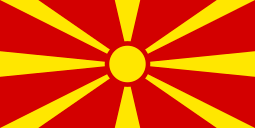




















Source: UEFA.com[19]
Awards
The following awards were given at the conclusion of the tournament:
- Player of the Tournament:

- Golden Boot:

Team of the tournament
After the tournament the Under-21 Team of the Tournament is selected by the UEFA Technical Observers.[22]
| Position | Player |
|---|---|
| Goalkeeper | |
| Defenders | |
| Midfielders | |
| Forwards | |
Sponsorship
| Sponsors |
|---|
References
- ↑ "Poland to host 2017 Under-21 EUROs". UEFA.com. 26 January 2015.
- ↑ "Cardiff to host 2017 UEFA Champions League final". UEFA.org. 30 June 2015.
- ↑ "Czech Republic to host 2015 Under-21 finals". UEFA.com. 20 March 2012. Retrieved 23 February 2014.
- ↑ "Strategic points lead Dubrovnik talks". UEFA.com. 20 September 2013. Retrieved 23 February 2014.
- ↑ "U21 final tournament expanding to 12 teams". UEFA.com. 24 January 2014. Retrieved 23 February 2014.
- ↑ "Euro 2020: Croatia, Poland and Portugal also withdraw". StadiumDB.com.com. 28 April 2014. Retrieved 30 May 2014.
- ↑ "Seedings set for 2017 U21 qualifying draw". UEFA.com. 30 January 2015.
- 1 2 3 4 5 6 "Regulations of the UEFA European Under-21 Championship, 2015–17" (PDF). UEFA.com. Retrieved 26 January 2015.
- ↑ "UEFA European Under-21 Championship Poland 2017 Official programme" (PDF). UEFA.com.
- ↑ "Final tournament draw". UEFA.com. Retrieved 1 December 2016.
- ↑ "Poland get holders and England in U21 EURO draw". UEFA.com. 1 December 2016.
- ↑ "Under-21 finals draw seedings". UEFA.com. 21 November 2016.
- ↑ "2015-17 UEFA European Under-21 Championship: Final draw procedure" (PDF). UEFA.com.
- ↑ "Za nami konferencja One Year To Go! Finał imprezy w Krakowie!". Sport.interia.pl. 7 June 2016. Retrieved 7 June 2016.
- ↑ "Under-21 match schedule" (PDF). UEFA.com.
- 1 2 3 4 5 6 7 8 9 10 11 12 13 14 15 16 17 18 19 20 Euro U-21 Livescore
- ↑ "FIFA Executive Committee approves key priorities to restore trust in FIFA". UEFA. 2 May 2016.
- ↑ "Weisers Kopfball macht den EM-Traum wahr" [Weiser's header makes the European Championship dream come true]. kicker.de (in German). kicker-sportmagazin. 30 June 2017. Retrieved 30 June 2017.
- ↑ "Statistics — Tournament phase — Player statistics — Goals". UEFA.com. Retrieved 30 June 2017.
- ↑ "Spain's Dani Ceballos named Player of the Tournament". UEFA.com. 30 June 2017.
- ↑ "Saúl Ñíguez wins U21 EURO adidas Golden Boot". UEFA.com. 30 June 2017.
- ↑ "The official Under-21 Team of the Tournament". UEFA.com. 1 July 2017.
- ↑ "adidas on board for UEFA EURO 2012". UEFA.com. Union of European Football Associations. Retrieved 30 March 2017.
- ↑ UEFA. "Carlsberg signs as Official Sponsor for UEFA national team competitions". UEFA.com. Union of European Football Associations. Retrieved 30 March 2017.
- ↑ UEFA. "Cinkciarz becomes UEFA EURO U21 Championship 2017 global sponsor". UEFA.com. Union of European Football Associations. Retrieved 30 March 2017.
- ↑ "Coca-Cola signs for Euro 2012, 2016". UEFA.org. Union of European Football Associations. 22 February 2010. Retrieved 30 March 2017.
- ↑ "Continental to sponsor Euro 2012 and 2016". UEFA.org. Union of European Football Associations. 20 October 2011. Retrieved 30 March 2017.
- ↑ "Hisense signs as UEFA EURO 2016 global sponsor". UEFA.org. UEFA. 14 January 2016. Retrieved 30 March 2017.
- ↑ "Hyundai-Kia joins as official sponsor for UEFA Euro 2012™ and UEFA Euro 2016™". UEFA.com. Union of European Football Associations. 2 March 2010. Retrieved 30 March 2017.
- ↑ "McDonald's signed up as official Euro sponsor". UEFA.org. Union of European Football Associations. 26 May 2010. Retrieved 30 March 2017.
- ↑ "SOCAR signs as Official Sponsor for UEFA national team competitions". UEFA.com. Union of European Football Associations. Retrieved 30 March 2017.
- ↑ "Turkish Airlines joins UEFA EURO 2016 as Official Airline Partner". UEFA.org. Retrieved 30 March 2017.
External links
| Wikimedia Commons has media related to UEFA European U-21 Championship 2017. |
- Official website
- 2017 finals: Poland, UEFA.com
- UEFA Under-21 Championship Poland 2017 tournament website (in Polish) (in English)
